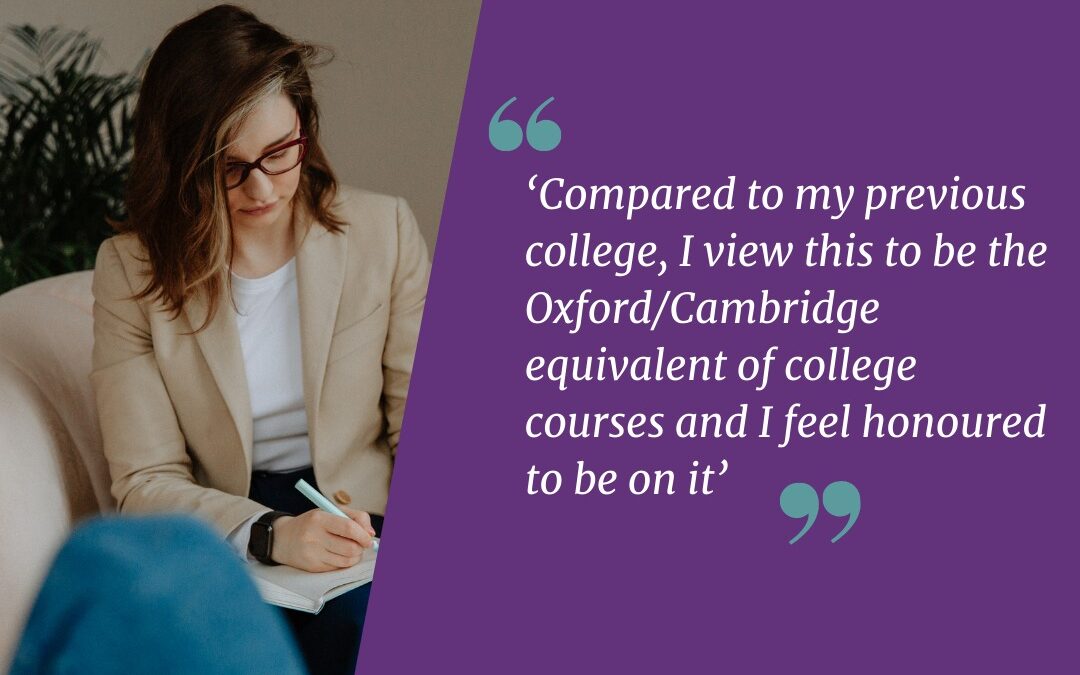I had some feedback from one of my students recently regarding the CPCAB Level 4 Diploma in therapeutic counselling course she is studying on. It said: ‘Compared to my previous college I view this to be the Oxford/Cambridge equivalent of college courses and I feel honoured to be on it’.
I was, of course, touched by this and it led me to reflect on what we are doing to deserve such positive feedback.
The courses at Westmeria are taught with the ‘Westmeria Ethos’:
- A focus on counselling- Westmeria is a Counselling college, not a college that does counselling. The tutors are passionate about the success of the college because they are passionate about counselling – and all the profits from the college fund the charity that provides low cost counselling to people in the local area. Every student, therefore, is contributing to this the moment they enrol on the course!
- A passion for counselling- As you can see above, I use this word ‘passionate’ a lot. There is good reason for this. The Westmeria ethos makes a distinction between ‘functional’ counselling and ‘passionate’ counselling. A functional counsellor might tick all the boxes, but a passionate counsellor commits to constantly challenge themselves to develop and grow, and this doesn’t stop when they qualify. This is, we believe, both one of the rewards of the work that we do, and a benefit to our clients.
- A focus on experiential learning- The courses at Westmeria focus on ‘experiential’ learning rather than ‘academic’ learning. We can read many books about psychological theory and repeat text book definitions of all the terms discussed within. This helps us to ‘know about’ things rather than ‘know’ them experientially – to get a ‘felt sense’ about them. Many people can tell me what empathy means – but what does it feel like when someone empathises with you? How do people react when you empathise with them? What does it feel like?
- A focus on creative learning- The college is a bit like a playground. Sure, there is a lot of work to get done, but college is also a place to try things out – to see what works for you and your clients rather than doing it in ‘a right way’ or a ‘wrong way’. When students focus less on ‘doing it right’ and more on ‘learning what works’ their anxiety goes down and they learn to fly. We believe that this kind of learning can be so important that we also include some focus on working creatively with clients as part of the curriculum.
- A relational approach- “Learn your theories as well as you can, but put them aside when you touch the miracle of the living soul” , Jung (1928) Theory is important. It underpins and informs our work in a way that helps us help our clients to understand themselves, the world (and people) around them and how they interact with the world (and people) around them. A solid foundation, then, in the three main theoretical counselling approaches (Person-centred, Psychodynamic and CBT), and how they might be integrated, is considered an essential part of the training…. but it is far from the whole training! Jung wrote this nearly a century ago, and it is, we believe, just as valid now as it was then. We recognise the importance of an effective therapeutic relationship as a part of any model of therapy….
- An integrative approach- We believe that we should tailor our approach to our clients rather than tailoring our clients to our approach. In order to do this, whichever approach suits your way of working, we believe that it is important to have an integrative understanding – i.e. one that is inclusive of and open to other ideas rather than exclusive of them.
- A Westmeria approach- I hope this gives you an idea of what we are trying to achieve through the training at Westmeria. This ethos applies to all the courses that we run and the additional training that we provide – indeed, it is why weprovide that training!
Written by Adam, Westmeria tutor and counsellor

